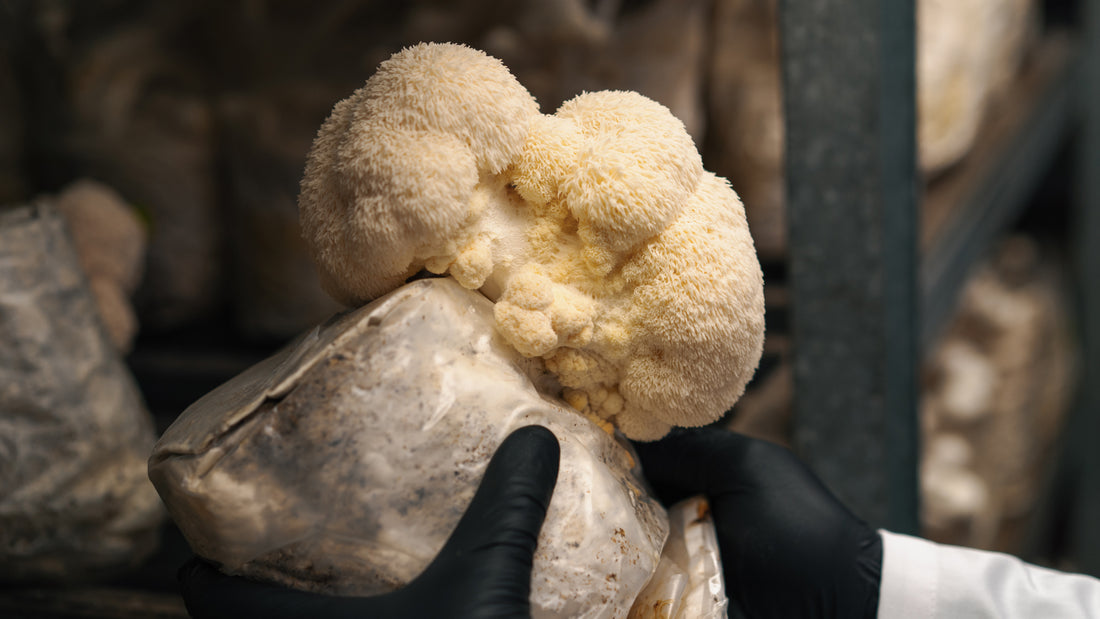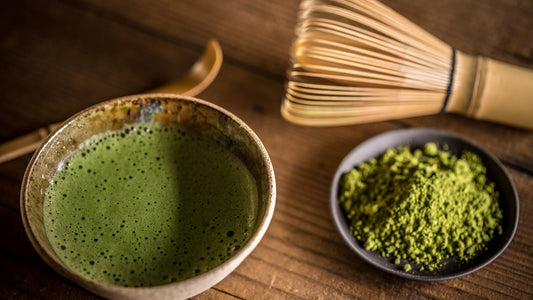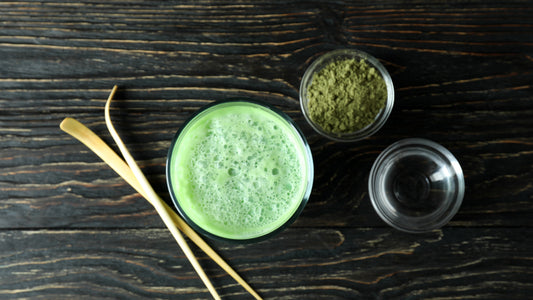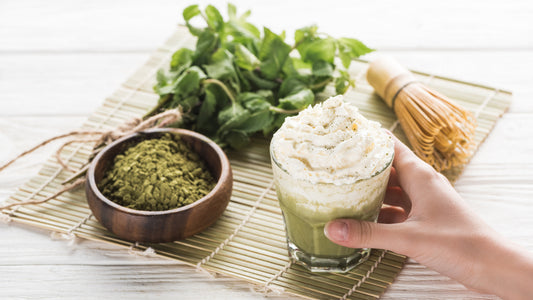Mushrooms have been very popular recently, be it medicinal or psychedelic. Wellness enthusiasts and medical professionals have already diverted their interest towards these marvels. And if you are also someone looking for healthier alternatives to treat your mental and physical ailments, then you must know about one of the best mushrooms.
With the growing popularity, there are various mushrooms used for different reasons, and it is very natural to get confused. But after today, at least one of your confusions wouldn't last long.
In this article, we’ll talk about Lion’s Mane, one of the most popular mushrooms. This white mushroom with tentacles can easily intrigue anyone. And if you're one among them and wondering, ‘Is Lion's Mane Mushroom psychedelic or not?' then this is just the article for you.
What is Lion's Mane Mushroom?

The Lion's Mane mushroom is a medicinal mushroom that possesses an interesting look. Scientifically known as Hericium erinaceus, it is popular in East Asia, such as China, Korea, and Japan, but it also occurs in Europe and parts of North America.
It gets its name from the very long, shaggy white spines, which bear a close resemblance to the mane of a lion. Its unique characteristics and distinctive looks make it easy to identify in the wild. Also, it is called Monkey Head Mushroom because of those same features. It has many health benefits, and one great thing about it is that it does not contain any psychoactive compounds.
Lion's Mane was used as medicine in ancient Asian societies. It was usually taken along with tea in the form of powder. It was also integrated into dishes to impart a distinctive flavor and texture. It was believed to offer neuroprotective properties. Thus, it was mainly given to kids and elders to help with their memory.
The Difference Between Lion's Mane and Psychedelic Mushrooms
Psychedelic mushrooms are commonly known as ‘magic mushrooms.’ These mushrooms have psychoactive compounds which, when consumed, can induce hallucinations, change of perceptions, change in mood, etc. Here are a few key differences between Lion's Mane and Psychedelic Mushrooms:
| Features | Lion's Mane | Psychedelic |
|---|---|---|
| Compounds | It contains compounds which have neuroprotective and cognitive properties. It promotes brain health and repairs neurons. Two such compounds are called hericenones and erinacines. | The compounds in Psychedelic Mushrooms are psychoactive, such as psilocybin and psilocin. These compounds are responsible for hallucinations and other such after-effects. |
| Effects | It not only enhances cognitive functions but also helps improve memory, reduce anxiety and depression, and support overall brain health. It is also helpful for diabetes, reducing inflammation and strengthening the immune system. | It causes hallucinations and changes in mood and perceptions. It can also bring a state of euphoria. It is also therapeutic when it comes to mental health problems such as PTSD, anxiety or depression. |
| Safety | Typically, Lion's mane is safe when used properly, but people with allergies can often experience side effects after consumption. You might get rashes, breathing issues, or discomfort in digestion. | It can have serious psychological risks. You can have paranoia or end up deep in anxiety and disorientation. People with mental health issues can also experience psychosis. |
| Legal Status | It is widely used for its medicinal value and is therefore legal everywhere. It can be consumed | It is mostly only used in shamanic practices. Its legal status varies from country to |
| in many forms, such as fresh, powdered, capsules, etc. | country. Both possession and cultivation are illegal in most places. |
Health Benefits of Lion's Mane
Lion's Mane Mushrooms have been used for centuries for medicinal purposes. Here are some of its health benefits:
Anti- Inflammatory and Antioxidant Properties
The substances such as polysaccharides, erinacines, and certain sterols found in Lion’s mane can be helpful in reducing inflammation or getting rid of harmful substances from your body, which are known as free radicals responsible for chronic diseases such as heart attack, cancer or diabetes.
Neuroprotection
Studies show that compounds like hericenones, erinacines, and polysaccharides of Lion's mane protect from diseases associated with loss in brain functions, such as Alzheimer’s. Moreover, the chemicals found in it help stimulate the growth, development and repair of other related mature and new neurons.
Diabetes Management
Studies indicate that Lion's Mane can play a role in regulating blood sugar levels. Its anti-inflammatory properties are known to be useful in reducing diabetes-related complications. Also, it benefits persons with diabetic nerve pain.
Cognitive Health
According to research, it was observed in a placebo-controlled trial that after 16 weeks of treatment with Lion's Mane tablets, people demonstrated an increase in cognitive function testing and significantly outperformed those who received the placebo.
The compounds found in Lion's Mane can help improve cognitive health by stimulating nerve growth factors. It supports brain health, which is beneficial for cognitive function, memory, and focus.
Safety and Consumption of Lion's Mane

Lion's Mane, like any other consumable, is safe as long as it is used appropriately. It has been used for centuries and is also given to kids. However, if you are allergic to mushrooms, you should try to avoid them.
A few known side effects are rashes, breathing problems, and digestive discomfort. It isn't a topic to be worried about since these side effects are mild and are only seen in very few people.
If you're using Lion's Mane for medicinal purposes, use it consistently for several weeks or months to see proper results. Start with a lower dose and gradually increase it to see better results.
Avoid mixing these mushrooms with any other medication. It is better to consult a healthcare professional if you have underlying health conditions or are allergic to fungi before using medications or supplements while consuming Lion's Mane.
How to Incorporate Lion's Mane Into Your Diet
Lion's Mane is a very simple and enjoyable ingredient to incorporate into your daily diet. Here are a few beneficial ways to include these mushrooms:
Mushroom Matcha
A super popular way to incorporate Lion's Mane would be through a mushroom matcha. Matcha is a sort of herbal tea which is widely consumed in Eastern Asia. It is also very convenient since matcha powders are available pre-made all over the world at this date.
Soups
You can soak dried Lion's Mane in water to make a flavourful broth or use fresh Lion's Mane and add it to your soups or stews. This is a great way to enjoy this mushroom's nutrients without wasting anything.
Baked Goods
Baked goods are popular among people of all ages. Use a little bit of Lion's Mane powder in your cakes, bread, or brownies to bring out a unique flavored baked good. You can also give it to people on special occasions or make a batch for guests during festivals and celebrations. Everyone will appreciate such a unique flavored dish.
Supplements
It is the most popular and convenient way to incorporate Lion's mane. Taking a capsule or tablet also ensures a daily dosage. It is also very helpful since they already come with the dosage details on the packet.
Tea
Adding just one tablespoon of powdered Lion's Mane can elevate both the flavor and benefits of your tea. It is a much healthier alternative to consuming Lion's Mane.
Conclusion
Lion's Mane can be beneficial for you in the long run. Whether you are trying to have a healthier lifestyle or treat your diseases and other health issues, you must give Lion's Mane a try.
Now, if you want to try out Lion's Mane Mushroom but you're not sure how to start, make sure to find out if you're allergic to it first. Take tests and be prepared. Take small doses and incorporate them into your daily diet slowly.
Although Lion's Mane is popular in every store, it is important to buy it from a trusted website like Mush Mouth. They test their products in labs for purity and quality, and they are also FDA-approved; therefore, there is no chance of health risks.
FAQs - Frequently Asked Questions
Q1. Is Lion’s Mane Psychedelic?
No, Lion's Mane is not a Psychedelic Mushroom. Unlike other Psychedelic Mushrooms, it does not have any psychoactive properties which cause hallucinations and changed perceptions and mods.
Q2. Is Lion's Mane Legal?
Yes, Lion's Mane is legal for both cultivation and consumption. It has been used throughout the world for centuries for medicinal purposes and is not illegal.
Q3. Is Lion’s Mane Mushroom addictive?
Lion's Mane Mushroom, which has been used as a herbal treatment, is not addictive. Only psychedelic compounds have the ability to get you addicted due to their euphoric effects and hallucinations, but Lion's Mane is completely safe.
Q4. Can Lion's Mane damage the liver?
Lion's Mane is a safe compound when used properly. It does not damage the liver or any other part of the body; rather, it helps with cognitive functions and repairs neurons. Lion's Mane is known for its healing properties.
Q5. What Happens if you take Lion's Mane every day?
Taking Lion's Mane daily can improve your memory and focus and also help in neuroprotection. However, consuming excess Lion's mane can result in nausea and vomiting, discomfort in digestion, and respiratory issues, which is why it is necessary to consult a doctor.
Q6. Will Lion's Mane make me sleepy?
Lion's Mane does not promote faster sleeping, so consuming it will not make you sleepy. However, consuming Lion's mane regularly can help reduce your anxiety, so in the longer run, it will help you sleep better by treating your anxiety.




